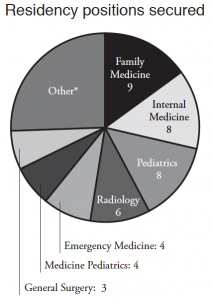Matching decrease won’t affect university

March 27, 2013
Medical students have seen training program acceptance rates drop, but area professionals say there’s no reason to worry.
Every year, medical students anticipate Match Day — the day they learn where they will spend the next three years furthering their training before taking on careers. Not as many students received a match this year, according to the Chronicle of Higher Education, and one reason might be the enrollment increase for medical students versus the stagnant number of residencies available annually.
So far, the university’s School of Medicine is not worried by the deficit.
Advertisement
Dr. Erik Constance, associate dean for student affairs at School of Medicine, said despite the smaller acceptance rate, those who are chosen are matched well.
“As the (Chronicle) of Higher Education noted, the match rate is nearly 94 percent — an impressive number,” he said.
University residency programs include locations in Carbondale, Decatur, Quincy and Springfield. Dr. Quincy O. Scott Jr., SIU Family Medicine Residency Program — Carbondale director, said all six of the city slots were filled this year. The school’s residency program is the only one at Carbondale Memorial Hospital, and this year’s slots were filled by School of Medicine alumni from cities such as Dongola, Marion, St. Louis and Chicago.
Many students stay within a 50-mile radius of Carbondale, Scott said.
Scott said the nationwide match decrease could be a result of increasing nursing program enrollment. New osteopathic medical schools — where students are taught a form of alternative healthcare that addresses the body’s ability to heal itself — are going to be open, and it is predicted there will be more students attending these schools in the next two years, he said.
Although these new schools provide students more educational options, Scott said the programs could be detrimental because the amount of available residencies aren’t increasing with the amount of students who are graduating from medical schools. Now, he said, even more students could be without residencies.
This will leave students without residencies, which are crucial for medical students’ education, he said.
Advertisement*
Some university residencies outside Carbondale are also completely full.
Cathy Brower, Springfield Internal Medicine Residency Coordinator, said her program filled all 14 available slots. Brower said the main concern is not the residency program, but the National Resident Matching Program itself. The program has an all in or all out policy, requiring to use the matching program to accept 100 percent of their residents, or they can’t use the program. Some hospitals don’t qualify for the program, so positions that could be filled by matching students are not available, she said.
Advertisement






